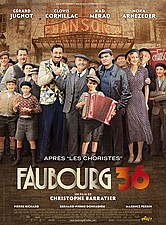
Knight at the Movies Archives
A crude crowd pleaser and an, oh so precious indie both give their respective audiences exactly what they came for
Two films opening in Chicago this week vividly illustrate the difference between the tastes of the “vulgar” mainstream masses and
the “cultured” indie snobs. Observe and Report, the mainstream effort, is indeed a vulgar but often hilarious comedy starring Seth
Rogan and its a million miles from the sentimental, sophisticated theatrical artifice of the French film Paris 36. But both films play
shamelessly to their core audiences – if Observe is purposely over the top in its bad taste (and boy is it ever) then Paris 36 is just as
self-congratulatory in its precious little stock characters and situations. You say “douche bag,” I say “cretin” but the effect is the
same – both movies work because they mine familiar stereotypes that expertly draw in their audiences. And here’s another
stereotype I’m happy to be the exception to: audiences who like one won’t like the other (not true – I liked both and think others
will, too).
The lowlife comedy first. In Observe and Report Jody Hill, writer-director of The Foot Fist Way and the Eastbound & Down HBO
series serves up the same mouth droppingly crude, unredeemable lead character that has quickly become his stock in trade. This
character is so appallingly inappropriate in his language and behavior that he draws laughs from an incredulous audience. In both
movies and the TV show Hill challenges his audience to shift their allegiance and end up rooting for this coarse white trash character
– a feat he pulls off consistently. In the process Hill also presents a rancid portrait of a culture so dimwitted, self involved,
materialistic, and immediately identifiable one almost feels a palpable, uncomfortable embarrassment when confronted with it –
when not laughing in recognition.
Hill’s leading man of choice Danny McBride is replaced this time out by Seth Rogan (though McBride provides a very funny cameo).
Rogan has quickly risen to the front ranks playing the Schlub Everyman (a sort of human embodiment of Homer Simpson). This
schlub is one Ronnie Barnhardt, the bi-polar head of security at an indoor shopping mall who is stymied in his efforts to catch a
flasher threatening his domain. His hold over the mall is threatened by the arrival of a real life cop (Ray Liotta) who also quickly
wins the heart of Brandi (Anna Faris, of course), a ditzy party girl who works a makeup counter and doesn’t know Ronnie’s alive. But
Ronnie is determined – really determined – to catch that flasher and win the day and maybe even make his drunken, dysfunctional
mama (a hilarious Ceila Weston) proud.
Though it’s hard to identify with defeated losers like Ronnie, Brandi, et al it also feels just great to feel superior to them and to
watch them hilariously, hopelessly screw up over and over again. Observe and Report is the latest in a long line of mean spirited,
snark filled, low down comedies that while it lasts gives stereotyping a good name.
In its way, so does the oh-so precious Paris 36 from writer-director Christophe Barratier (best known here for 2004’s Les Choristes).
Set in 1936, the action centers on the performers and stage hands at the failing music hall the Chansonia, situated in a seedy
district of Paris and closed by its unscrupulous new owner, the local political boss. Most of the action centers on Pigoil (Gerard
Jugnot), the stage manager who has lost his livelihood and contact with his son when his wife, star of the show, leaves town for
another man with the boy in tow. Eventually a desperate and destitute Pigoil and his allies secretly begin hosting shows in the
theatre, bringing in new talent to go with the old (including a hambone comic and a foppish choreographer) with hopes that their new
star, the songbird Douce (Nora Arnezeder), who is beloved by the political activist hunk Milou (Clovis Cornillac) and the political boss,
will win the day.
The plot is a familiar cross between Mrs. Henderson Presents and Moulin Rouge (the film has the same artificial lighting, sets and
costumes that added to the theatrical feel of those two) and the characters sing a lot of original French songs that Piaf would have
adored. To a man, every character and situation has been seen in dozens of previous French movies, the sentimentality is so thick
it could be cut off with a guillotine, and nothing here lasts in the mind beyond the final “alouette” but while Paris 36 is unfolding
Barratier manages to wrap up the strands of this stereotypical “little” French film into an awfully sweet package.
the “cultured” indie snobs. Observe and Report, the mainstream effort, is indeed a vulgar but often hilarious comedy starring Seth
Rogan and its a million miles from the sentimental, sophisticated theatrical artifice of the French film Paris 36. But both films play
shamelessly to their core audiences – if Observe is purposely over the top in its bad taste (and boy is it ever) then Paris 36 is just as
self-congratulatory in its precious little stock characters and situations. You say “douche bag,” I say “cretin” but the effect is the
same – both movies work because they mine familiar stereotypes that expertly draw in their audiences. And here’s another
stereotype I’m happy to be the exception to: audiences who like one won’t like the other (not true – I liked both and think others
will, too).
The lowlife comedy first. In Observe and Report Jody Hill, writer-director of The Foot Fist Way and the Eastbound & Down HBO
series serves up the same mouth droppingly crude, unredeemable lead character that has quickly become his stock in trade. This
character is so appallingly inappropriate in his language and behavior that he draws laughs from an incredulous audience. In both
movies and the TV show Hill challenges his audience to shift their allegiance and end up rooting for this coarse white trash character
– a feat he pulls off consistently. In the process Hill also presents a rancid portrait of a culture so dimwitted, self involved,
materialistic, and immediately identifiable one almost feels a palpable, uncomfortable embarrassment when confronted with it –
when not laughing in recognition.
Hill’s leading man of choice Danny McBride is replaced this time out by Seth Rogan (though McBride provides a very funny cameo).
Rogan has quickly risen to the front ranks playing the Schlub Everyman (a sort of human embodiment of Homer Simpson). This
schlub is one Ronnie Barnhardt, the bi-polar head of security at an indoor shopping mall who is stymied in his efforts to catch a
flasher threatening his domain. His hold over the mall is threatened by the arrival of a real life cop (Ray Liotta) who also quickly
wins the heart of Brandi (Anna Faris, of course), a ditzy party girl who works a makeup counter and doesn’t know Ronnie’s alive. But
Ronnie is determined – really determined – to catch that flasher and win the day and maybe even make his drunken, dysfunctional
mama (a hilarious Ceila Weston) proud.
Though it’s hard to identify with defeated losers like Ronnie, Brandi, et al it also feels just great to feel superior to them and to
watch them hilariously, hopelessly screw up over and over again. Observe and Report is the latest in a long line of mean spirited,
snark filled, low down comedies that while it lasts gives stereotyping a good name.
In its way, so does the oh-so precious Paris 36 from writer-director Christophe Barratier (best known here for 2004’s Les Choristes).
Set in 1936, the action centers on the performers and stage hands at the failing music hall the Chansonia, situated in a seedy
district of Paris and closed by its unscrupulous new owner, the local political boss. Most of the action centers on Pigoil (Gerard
Jugnot), the stage manager who has lost his livelihood and contact with his son when his wife, star of the show, leaves town for
another man with the boy in tow. Eventually a desperate and destitute Pigoil and his allies secretly begin hosting shows in the
theatre, bringing in new talent to go with the old (including a hambone comic and a foppish choreographer) with hopes that their new
star, the songbird Douce (Nora Arnezeder), who is beloved by the political activist hunk Milou (Clovis Cornillac) and the political boss,
will win the day.
The plot is a familiar cross between Mrs. Henderson Presents and Moulin Rouge (the film has the same artificial lighting, sets and
costumes that added to the theatrical feel of those two) and the characters sing a lot of original French songs that Piaf would have
adored. To a man, every character and situation has been seen in dozens of previous French movies, the sentimentality is so thick
it could be cut off with a guillotine, and nothing here lasts in the mind beyond the final “alouette” but while Paris 36 is unfolding
Barratier manages to wrap up the strands of this stereotypical “little” French film into an awfully sweet package.
Give 'Em What They Want:
Observe and Report-Paris 36
Expanded Edition of 4-8-09 Windy City Times KATM Column
By Richard Knight, Jr.
Observe and Report-Paris 36
Expanded Edition of 4-8-09 Windy City Times KATM Column
By Richard Knight, Jr.

